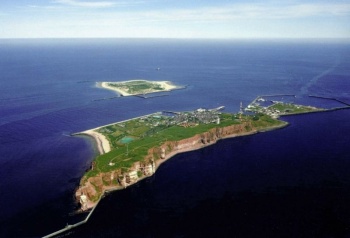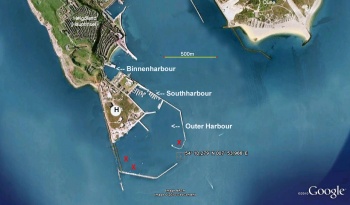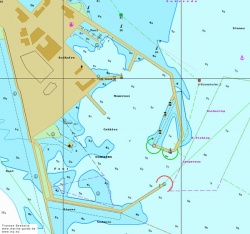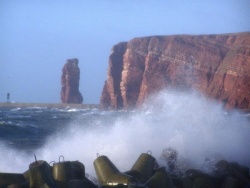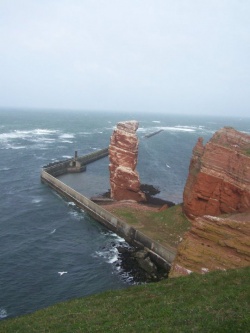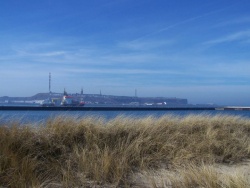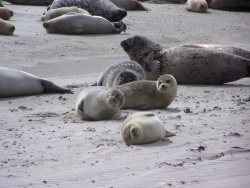Helgoland
From CruisersWiki
(→Cruising the region) |
(→Cruising the region) |
||
| Line 26: | Line 26: | ||
| - | The German Bight around Helgoland is a heavy commercial traffic area, coming in from the south western North Sea with destinations in the River Jade, Weser or Elbe, continuing through the Kiel Kanal at Brunsbüttel or to Europe's second biggest Port of [[Hamburg, Germany]]. To safely manage the dence traffic a huge system of Traffic Separation Schemes (TSS) has been installed, starting with the TSS Dover Strait continuing in the Southern North Sea off the coast of Belgium and the Netherlands and splitting off into at about 54°05'N, 004°20'E to the TSS German Bight Western Approach. At the eastern end the TSS German Bight Western Approach and the TSS Tershelling-German Bight merge into the TSS Jade Approach and the TSS Elbe Approach. It is strongly recommended to avoid these areas wherever possible – the crossing of all TSS has to be done according to Rule 10 ( c ) of the International Regulations for Preventing Collisions at Sea (IRPCS): on a heading as nearly as practicable at right angles to the general direction of traffic flow. You must keep in mind the wind and tidal impact and as the TSS in the German Bight are under constant radar surveillance it is more strongly advised to even keep a reasonable course by using the motor, if the ground speed falls below 3knots or this course cannot be obtained. | + | The German Bight around Helgoland is a heavy commercial traffic area, coming in from the south western North Sea with destinations in the River Jade, Weser or Elbe, continuing through the Kiel Kanal at Brunsbüttel or to Europe's second biggest Port of [[Hamburg, Germany]]. |
| + | |||
| + | To safely manage the dence traffic a huge system of Traffic Separation Schemes (TSS) has been installed, starting with the TSS Dover Strait continuing in the Southern North Sea off the coast of Belgium and the Netherlands and splitting off into at about 54°05'N, 004°20'E to the TSS German Bight Western Approach. At the eastern end the TSS German Bight Western Approach and the TSS Tershelling-German Bight merge into the TSS Jade Approach and the TSS Elbe Approach. | ||
| + | |||
| + | It is strongly recommended to avoid these areas wherever possible – the crossing of all TSS has to be done according to Rule 10 ( c ) of the International Regulations for Preventing Collisions at Sea (IRPCS): on a heading as nearly as practicable at right angles to the general direction of traffic flow. You must keep in mind the wind and tidal impact and as the TSS in the German Bight are under constant radar surveillance it is more strongly advised to even keep a reasonable course by using the motor, if the ground speed falls below 3knots or this course cannot be obtained. | ||
| + | |||
* | * | ||
* | * | ||
Revision as of 21:41, 9 May 2012
Helgoland / Heligoland
Heligoland (German: Helgoland) is a small German archipelago with its characteristic red cliff line, (61 meter high), located in the Heligoland Bight (part of the German Bight) in the south-eastern corner of the North Sea, approximately four hours sailing time from Cuxhaven (35 nm) at the mouth of the River Elbe. Heligoland consists of two islands: main island (Hauptinsel) to the west and the Dune (Düne) to the east. Heligoland is now a holiday resort and enjoys a tax-exempt status, as it is part of the EU but excluded from the EU VAT area and customs union, and consequently, much of the economy is founded on sales of cigarettes, alcoholic beverages and perfumes to tourists who visit the islands, but also tax-free Diesel for ships.
The main island has a good harbour, a former naval base, and is frequented mostly by sailing yachts on the way from the English Channel or Netherlands to the River Elbe up to Hamburg, Germany or on the way to the Baltic Sea by using the Kiel Canal (German: Nord-Ostsee-Kanal, NOK). Heligoland is located 30 nm north off the German coastline and as most of the harbours along the East Frisian and North Frisian coast are located 'behind' the islands, they can only be reached by passing through the Seegaten between the islands. These Gatts should not be entered at night and it is dangerous to enter under fresh- to strong onshore winds and it is even impossible to do so under stormy conditions. Therefore, Heligoland is the best and safest harbour for a stopover. Yachts should pass the Outer Harbour to go into the South-Harbour. Fuel/Diesel you can get in the Binnenhafen.
Also, there is a search and rescue (SAR) base of the DGzRS, the Deutsche Gesellschaft zur Rettung Schiffbrüchiger ("German Maritime Search and Rescue Service") on Heligoland.
Background
Cruising the region
Helgoland is port of entry. Customs office in south-harbour.
EU Vessels & EU Nationals For European Union members, EU regulations apply. Vessels arriving from another EU country do not need to clear customs. Vessels registered in countries falling under the Schengen Agreement, (i.e. vessels from Spain or Italy) do not need to clear immigration.
Non-EU Vessels (incl. EU vessels with non-EU nationals aboard) The skipper must report to customs with the ship's registration papers and passports and sometimes the customs officials will visit the boat on arrival. The Customs officials may also sometimes inspect yachts. The port captain must be contacted immediately on arrival in the marina and he will usually notify Customs. If not, the skipper must phone Customs.
The German Bight around Helgoland is a heavy commercial traffic area, coming in from the south western North Sea with destinations in the River Jade, Weser or Elbe, continuing through the Kiel Kanal at Brunsbüttel or to Europe's second biggest Port of Hamburg, Germany.
To safely manage the dence traffic a huge system of Traffic Separation Schemes (TSS) has been installed, starting with the TSS Dover Strait continuing in the Southern North Sea off the coast of Belgium and the Netherlands and splitting off into at about 54°05'N, 004°20'E to the TSS German Bight Western Approach. At the eastern end the TSS German Bight Western Approach and the TSS Tershelling-German Bight merge into the TSS Jade Approach and the TSS Elbe Approach.
It is strongly recommended to avoid these areas wherever possible – the crossing of all TSS has to be done according to Rule 10 ( c ) of the International Regulations for Preventing Collisions at Sea (IRPCS): on a heading as nearly as practicable at right angles to the general direction of traffic flow. You must keep in mind the wind and tidal impact and as the TSS in the German Bight are under constant radar surveillance it is more strongly advised to even keep a reasonable course by using the motor, if the ground speed falls below 3knots or this course cannot be obtained.
Charts
Radio Nets
Harbour Master Bundeshafen: Tel 0049 4725-504, UHF-Radio Channel 67, Call "Helgoland Port".
MEZ 9:45 and MEZ 19:45 (Central European Time, CET) Weather Information: Küstenfunkstellen (Shipradio) DP07 Seefunk: Hamburg Radio Channel 27 und 83, Elbe-Weser Radio Channel 24 und 01, Helgoland Radio Channel 88, Nordfriesland Radio Channel 26, Borkum Radio Channel 28 und 61
Local Weather
Weatherstation: Tel 0049 4725-606 Helgoland Weather
Details?
Offshore Islands
The dune (Düne), o,5 nm north-east, with sandy beaches, camping area, airflied and restaurant. Ferry service from main island (Hauptinsel) is available at north harbour.
Marinas & Yacht Clubs
South Harbour, Watersportclub Helgoland: Tel 0049 4725-585
North Harbour (privat) for motor yachts
Anchorages
List details of all safe anchorages in the area.
Tourism and Things to do Ashore
Tourism
The island of Heligoland is a geological oddity; the presence of the main island's characteristic red sedimentary rock in the middle of the German Bight is unusual. It is the only such formation of cliffs along the continental coast of the North Sea. Outstanding is the single red rock in the north, namend 'Lange Anna'. The Lange Anna ("Long Anna" or "Tall Anna") which is a free standing rock column (or stack), 47 metres (154 ft) high and weighing about 25,000 tons.
Fuel, Water, & Electricity
Fuel station is in the 'Binnenharbour'. Water, Electricity, Sanitary Installations WC/Shower in the Marina Restaurant South-Harbour.
Laundry
Grocery & Supply Stores
Eateries
Internet/WiFi
Marina Restaurant
Motorbike & Car Rentals
No cars, bikes and bicyles are allowed on the island
Marine Stores & Facilities
The company and traditional family Rickmers operates the fuel-station and a hugh marine-store at 'Binnenhafen'. On their homepage you will find pictures of the station and prices and openings. Because the tidal ranges of up to 3 meters, it is difficult for deepgoing yachts to use the 'Binnenhafen' during low tide. After mooring at the station, you can call for the service.
Repairs/Yards
Garbage Disposal
?
Transportation
Transportation (local and/or international)
Routes/Passages To/From
Popular passages/routes, timing, etc.
Cruiser's Friends
Contact details of "Cruiser's Friends" that can be contacted for local information or assistance.
Forum Discussions
List links to discussion threads on partnering forums. (see link for requirements)
External Links
- http://www.helgoland.de
- Rickmers
- Helgoland (Wikipedia DE)
- Hafen Helgoland (WSV)
- Wassersportclub Helgoland
Personal Notes
Visited several times on trips from Hamburg and Bremen to Netherland, last 2010, --Blome 22:14, 8 May 2012 (BST)
References & Publications
Publications, Guides, etc.
Last Visited & Details Checked (and updated here)
Date of member's visit to this Port/Stop & this page's details validated:
|
|---|
|
Names: |
| |
|---|
| | HOMEPAGE | Wiki Contents | North Sea | Baltic | Germany | Helgoland | |
